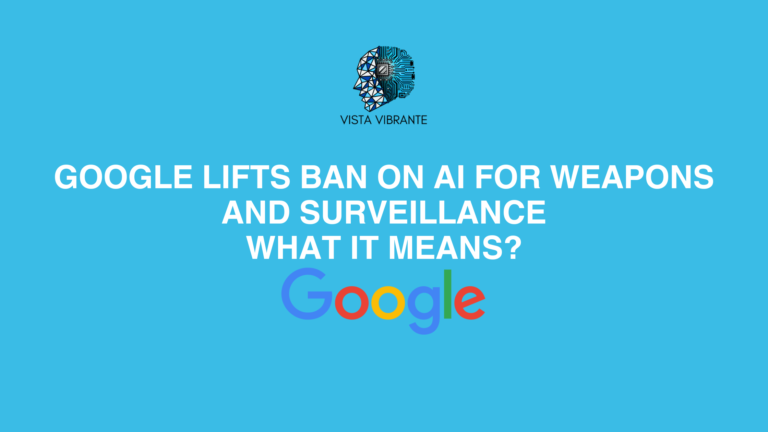Google AI for Weapons: Ban Lifted—What It Means for Security
Did you know Google just changed its credibility on Google AI for weapons use? They once promised never to weaponize AI, but now that promise is gone. What do you think about that?”
This week, Google updated its AI ethics policy, lifting a long-standing ban on using AI to create weapons and conduct surveillance.

The policy page no longer contains that statement:
The previous policy stated that the company would not use AI to develop weapons or other technology intended to harm people or to employ technology for monitoring that goes beyond international standards.
James Manyika, senior vice president of Google, and Demis Hassabis, co-founder of DeepMind, argue in a blog post supporting the decision that government and industry should collaborate on AI that “supports national security.”
Google AI for Weapons: What This Policy Shift Means
Google bans AI for weapons because of ethical concerns, safety risks, and its commitment to responsible AI development.
Ethical Responsibility If AI-powered weapons could decide to kill without human control, there could be serious ethical issues. Autonomous weapons have the potential to violate international law and human rights.
Risk of Misuse Criminals could use AI in battles to their advantage, resulting in unpredictable conflicts. Target misidentification by AI systems could result in the deaths of civilians.
Company Reputation and Employee Protest Google’s initial motto was “Don’t be evil”
In 2018, Google employees protested against Project Maven, a Pentagon AI initiative that used machine learning to examine drone footage.
Later On, Google decided not to renew the contract. Supporting AI for weapons could damage Google’s public image
Pay Attention to Positive AI Instead of using AI for war, Google prefers to use AI for medical, environmental, and social good rather than warfare. Their AI ethics policy emphasizes applications that promote safety and fairness.
Several factors have driven this important policy change:
- National security issues: Growing global tensions and other countries developing their AI abilities, guided by principles like freedom and human rights, the company now highlights the significance of cooperation between government and businesses.
- Competitor Involvement: Microsoft and Amazon, among other large tech companies, have been actively involved in national security and defense initiatives.To maintain its dominance and influence in the AI market. Google has decided to balance its standards with more general industry standards.
Can AI be controlled enough to prevent disaster?
Google AI for weapons and military applications marks a major shift, raising questions about security and global stability. On one hand, AI can improve defense by helping with surveillance, cybersecurity, and other security tasks. On the other hand, it could lead to an AI arms race, where countries rush to develop powerful AI for war, increasing the risk of conflicts. There’s also concern that AI could be used for spying or even creating autonomous weapons, making war more automated and harder to control.



